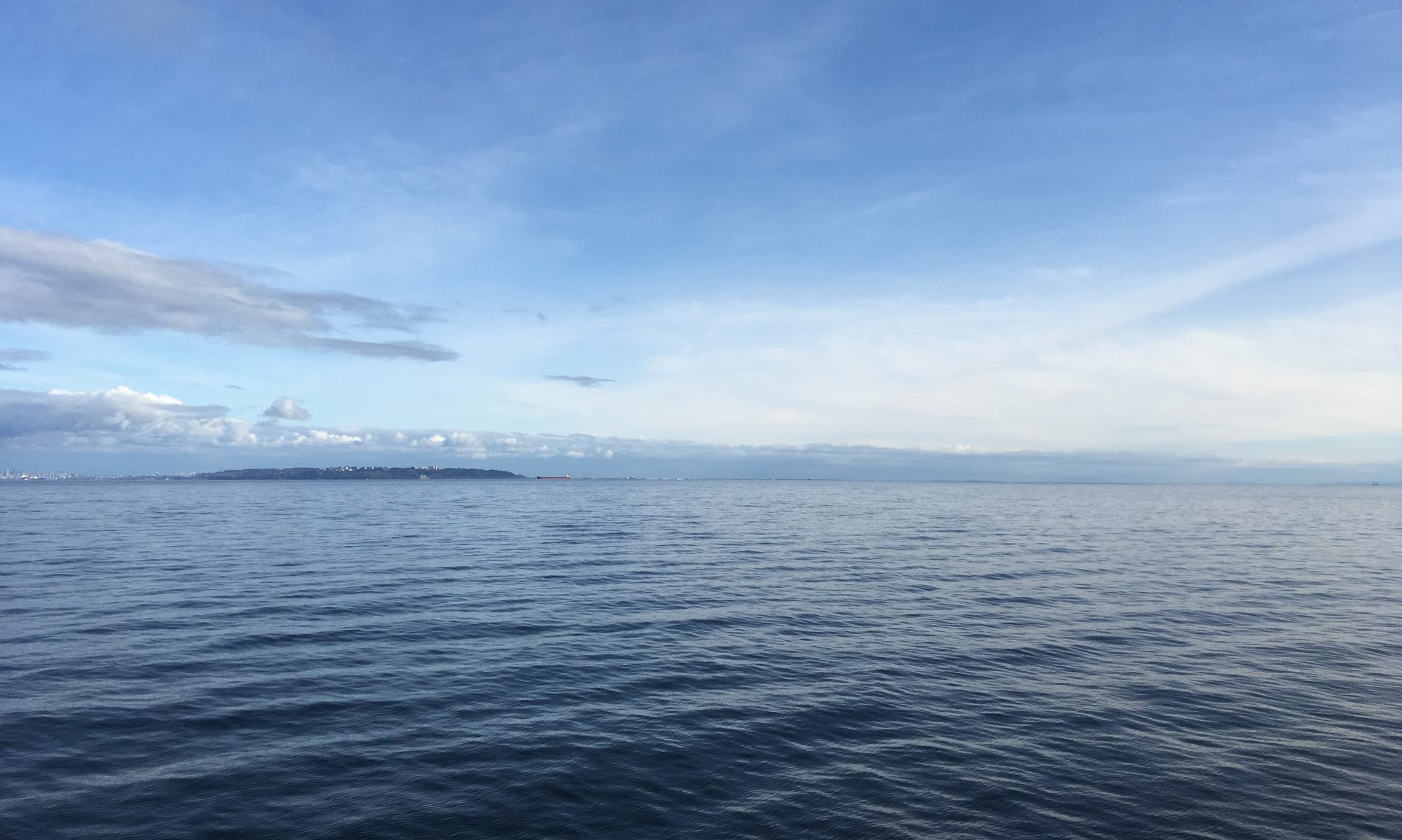Indigenizing the Academy at Capilano University
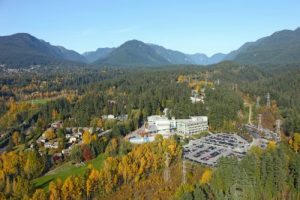
This Digital Research Folio is concerned with the topic of “Indigenizing the Academy” in the context of the Capilano University’s North Shore community.
Capilano University’s “North Vancouver campus is located on the traditional and [unceded] territory of the Squamish (Sḵwx̱wú7mesh) and Tsleil-Waututh Nations of the Coast Salish people” (“Capilano University honouring truth and reconciliation”). The university’s geographic location both deepens and complicates its relationship with these nations. A committee devoted to Indigenizing the Academy was struck in 2012 at the North Vancouver campus in an attempt to improve First Nations student success, bring Indigenous knowledges into the curriculum, and promote positive intercultural relationships between Indigenous and non-Indigenous community members. This paper will clarify the meaning of the phrase Indigenizing the Academy, by familiarizing readers with its theoretical roots and significance, and discuss Capilano University’s role in this movement. Some conceptual criticism and proposed recommendations for the future will also be included.
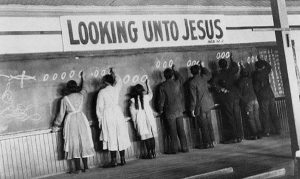
Historically, for the people of the Squamish and Tseil-Waututh nations, “colonizers used education-most notably in the form of residential schools-as a powerful weapon in an effort to destroy Indigenous cultures” (Liscomb).
Many argue that the colonial roots of the Canadian education system are still reflected in its dominant curriculum and overall structure and function. According to Indigenous scholar Devon Abbott Miheusuah, Indigenizing the Academy means “working to change universities so that they become places where the values, principles, and modes of organization and behavior of [First Nations] people are respected in, and hopefully even integrated into, the larger system of structures and processes that make up the university itself” (88).
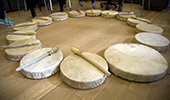
”Indigenization at the [University of Regina] is understood as the transformation of the existing academy by including Indigenous knowledges, voices, critiques, scholars, students and materials as well as the establishment of physical and epistemic spaces that facilitate the ethical stewardship of a plurality of Indigenous knowledges and practices so thoroughly as to constitute an essential element of the university. It is not limited to Indigenous people, but encompasses all students and faculty, for the benefit of our academic integrity and our social viability” (Pete)
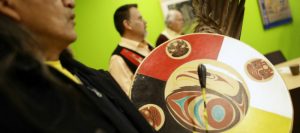
At Capilano University’s North Vancouver campus, First Nations Services faculty member David Kirk has been an outstanding and dedicated leader in First Nations program development, event organization, and student success strategy. He explains that ”over the last few years in academia there has been a focus on Indigenous knowledge and attempts to validate it….[including] brilliant Indigenous scholars such as Jo-ann Archibald, Marie Battiste, Lee Brown, Michael Marker, Linda Smith, and Richard Atleo to name a few…bringing to the forefront the importance of Indigenous knowledge, teachings and culture within the education setting. These are all important factors of one’s cultural identity in a dominated western world of education allowing Indigenous students to freely express their identity.” (Kirk 2)
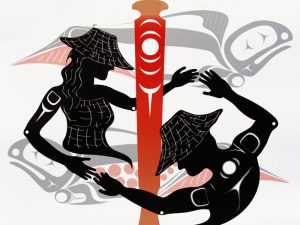
The recent surge in Indigenization efforts in Canada stem from the Truth & Reconciliation Commission Report which issued 94 “Calls to Action” aimed to “redress the legacy of residential schools and advance the process of Canadian reconciliation” (“Truth and Reconciliation Commission (Canada)”). Included in the report was a “plea for relevant curricula to support Indigenous students” (“Truth and Reconciliation Commission of Canada : Calls to Action”).
In response to the federal report’s recommendations, Canadian universities, including Capilano, directed increased attention towards the inclusion of First Nations “content and pedagogy, an effort that began before the Commission made its recommendations but has accelerated since then” (Lewington 54). Many positive changes are slowly being made to Canadian Universities to make “space for indigenous knowledge systems and practices” (Macdonald).
According to the Reconciliation Canada Ambassador Chief Dr. Robert Joseph, efforts to “respond to a call for action and commit to reconciliation…[have the potential] to renew relationships for a shared tomorrow, based on a shared understanding of our histories and our cultures. [According to Joseph, these sorts of] initiatives are weaving a stronger and more vibrant social fabric, based on the unique and diverse strengths of Canadians and their communities.” (qtd. in “Capilano University honouring truth and reconciliation”)
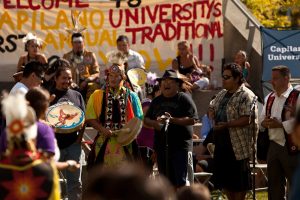
While the meaning of the phrase and its importance are clear, the question of how to Indigenize the Academy still remains. It may involve “making adjustments to the scholarship that qualifies as valid for promotion and credentialing purposes” (MacDonald) and acknowledging the multitude of “ways in which knowledge can be circulated and disseminated” (7). More flexibility in hiring criteria may also be needed to increase the number of First Nations instructors and to “fill staffing gaps in niche areas such as at-risk indigenous languages” (MacDonald), since those with “with deep knowledge of indigenous arts and culture may not have doctorates” (MacDonald).
Notable improvements thus far have been increased “recruitment and improved retention of indigenous students” (MacDonald), the introduction of elders-in-residence programs, and the provision “of in-service training and pedagogical supports for educators” (MacDonald). Indigenization depends on Indigenous leadership and ought to receive support from non-First Nations people in order for both to learn and share in the exchange.
A number of improvements have been implemented at Capilano University so far. For example, the Indigenizing the Academy committee, led by First Nations Services faculty members, David Kirk and Clay Little, have been responsible for organizing the annual celebration of Truth and Reconciliation Week on campus. The first Truth and Reconciliation Week was celebrated at the North Vancouver campus in 2012 (the same year that the Indigenizing the Academy committee was struck).
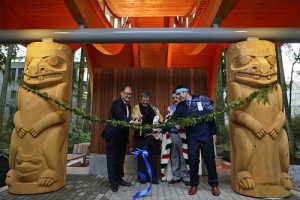
Past Truth and Reconciliation Week events have included “film screenings, Squamish Elder Latash Nahanee speaking to history classes, panel discussions, talking circles and potlucks” (“September 15, 2016: Capilano University’s fourth…”). According to Indigenizing the Academy committee member and English department faculty member, Reg Johanson, the committee’s “primary focus in the beginning was the Truth and Reconciliation week. Since then, [they’ve] been trying to do other things out of that committee as well” including the initiation of an instructors’ “reading discussion group…that grew out of the committee…called the campus-learning community on colonized classrooms and racism” (Johanson).
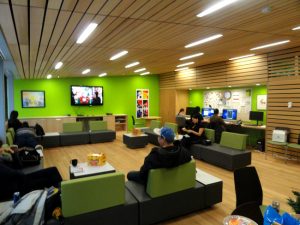
According to Johanson, the Indigenizing the Academy committee used to meet on a monthly basis to collaborate on a formal bid for a First Nations studies program, to stay informed on the status of the Coastal Corridor Consortium, a partnership between Capilano University, Lil’Wat Nation, Metis Nation British Columbia, Musqueam Nation, Native Education College, Sechelt Nation, Squamish Nation, Tsleil- Waututh Nation and Vancouver Community College established in “2007 to submit a proposal to Ministry of Advanced Education for funding to support Aboriginal learners and expand programs” (Kirk 4), and to organize reconciliation-themed campus events, but “haven’t done much over the last year.” (Johanson)
When asked to comment on the forms and level of support the committee has received from the university administration, Johanson explained that they “get a lot of support for the Truth and Reconciliation week”, but “when it comes to support for things that are a little bit broader, a little bit bigger, a little bit more ambitious, it’s been very, very slow. Very, very slow. If any progress at all.” (Johanson) He mentioned the renaming of the campus buildings with Indigenous names and the expansion of the First Nations Student Centre as positive changes and suggested that we “give Cap credit for doing those little things” (Johanson), but also pointed out that these gestures “are easy to do. Knock out a wall. Put up a plaque. Give some money to a group of people who are organizing something on their own time, on their own salary, off the side of their desk…that’s easy to do and it looks good for the university.” (Johanson)
When the Indigenizing the Academy committee worked on trying to get the university’s name “retroactively given to [it] properly through the [traditional Squamish] protocol”, because the name was assumed in 1968 without gaining consent from the Squamish nation to use it, they did not receive sufficient administrative support to move forward. “In the nation, in the band itself, if you want a name you have to throw a big feast and it costs tens of thousands of dollars. It’s a big thing” (Johanson) with serious cultural significance. This is one opportunity, yet to be exploited by Capilano University, to genuinely reconcile past injustices and demonstrate respect for First Nations’ sovereignty, cultures, and traditional practices.
Johanson worries, alongside other scholars and critics, that there are some potential, paradoxical risks in attempting to Indigenize the Academy :
“A colleague here, who has done a lot of work with Indigenous communities, put it succinctly, he said : “Indigenizing the Academy, sometimes I think that’s really about Academicizing the Indigenous” which I thought was kind of a concise way of putting the problem.” (Johanson)
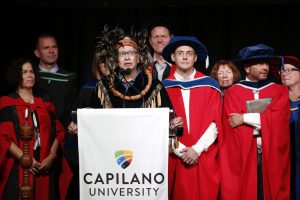
Some critics claim that efforts to Indigenize the Academy mistakenly assume the academy is worth Indigenizing (Betasamosake Simpson). Furthermore, in Elina Hill’s article she “explains how efforts to Indigenize the Academy could easily slip into “forms of colonization [and that] defining [related] theories, strategies, and methods as “indigenization” might once again work to mystify the thought of Indigenous people, relegating them to a “cultural” category of difference with the ability to infuse Western thought with new life…, and/or able to criticize (Western) theory and scholarship…, but never really [to occupy] the centre” (Hill) of it. According to the Indigenous scholarship Hill draws upon in the article, “the university may be part of decolonizing processes [,but] the work of decolonization…is not only the work of Indigenous people. Non-Indigenous thinkers must find ways to be attentive and reflective of Indigenous thought, inside and outside of the academic sphere without simply “indigenizing” (or making native”) settler systems of belief” (Hill).
When interviewed for this research paper on the topic of Indigenizing the Academy, numerous Capilano University students from the North Vancouver campus reported being unfamiliar with the concept and unaware of the existence of a committee dedicated to this aim. One Liberal Studies student, of Coast Salish heritage, was able to comment:
“As an Indigenous person attending school on the unceded territory of my peoples, I would definitely appreciate more indigenizing aspects to our…education. I understand at the beginning of every school year in September we pay tribute to those who experienced residential schools and that’s a great start! I also appreciate it when teachers acknowledge the lands they work on at the beginning of each term. In terms of actually Indigenizing, more history would be great” (Gonzales).
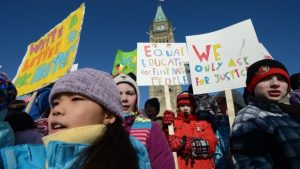
Despite many valiant efforts to Indigenize the Academy at Capilano University’s North Vancouver campus, it seems that it remains an optional, surface-level endeavour rather than an authentic, cooperative, university-wide effort. This is most likely due to a combination of factors including : lack of genuine administrative support, insufficient education leading to poor community engagement, and inconsistent provincial and federal funding to support initiatives and program development.
This paper has demonstrated the importance of this topic of investigation in the context of Capilano University. While there is substantial academic literature on this topic and ongoing work being done to Indigenize the Academy (in order improve First Nations student success and to end the structural violence First Nations students endure within the Canadian education system) through the establishment of committees devoted to doing so and the emergence of innovative, culturally appropriate programming in Canadian universities, research shows that more could still be done to reduce the barriers to access and social injustices that First Nations students face and to truly Decolonize the Academy.
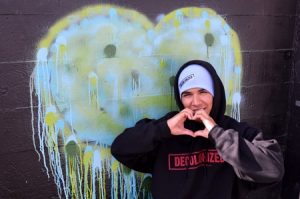
Works Cited :
“Capilano University honouring truth and reconciliation” Capilano University, 11 Sept. 2013, https://www.capilanou.ca/news.aspx?id=28555&aud=0.
Betasamosake Simpson, Leanne. “Land as Pedagogy” Decolonization: Indigeneity, Education & Society, vol. 3, no. 3, 2014, pp. 1-25
Gonzales, Jayden Rene. Personal Interview. 21 Nov 2017.
Hill, Elina. “A Critique of the Call to ‘Always Indigenize!’” Peninsula : A Journal of Relational Politics, vol. 2, no. 1, 2012, https://journals.uvic.ca/index.php/peninsula/article/view/ 11513/321 . Accessed November 2017.
Johansen, Reg. Personal interview. 24 Nov 2017.
Kirk, David. ”Aboriginal Student Success Strategy.” Capilano University, 2015, https:// www.capilanou.ca/Aboriginal-Student-Success-Strategy-.html.
Lewington, Jennifer. “Truth and Education.” Maclean’s, vol. 130, no. 10, Nov. 2017, pp.
52-56. EBSCOhost, ezproxy.capilanou.ca/login?url=https://search-ebscohost- com.ezproxy.capilanou.ca/login.aspx?direct=true&db=a9h&AN=125516820&site=ehost- live&scope=site.
Liscomb, Robie. “Turning the wheels of change: Indigenizing the Academy.” University of Victoria, 4 Oct. 2012. https://www.uvic.ca/news/topics/2012+indigenizing-the-academy +ring .
Macdonald, Moira. “Indigenizing the Academy : What some universities are doing to weave indigenous peoples, cultures, and knowledge into the fabric of their campuses.” University Affairs, April 6 2016. https://www.universityaffairs.ca/features/feature-article/ indigenizing-the-academy/.
Mihesuah, Devon Abbott. “Indigenzing the Academy : Transforming Scholarship and Empowering Communities.” University of Nebraska Press, 2004. Print.
Pete, Shauneen. “100 way to Indigenize and decolonize academic programs and courses.” University of Regina, 6 April 2016, https://www.uregina.ca/president /assets/docs/ presidentdocs/indigenization/indigenize-decolonize-university-courses.pdf
“September 15, 2016: Capilano University’s fourth Truth and Reconciliation Week runs September 19 to 23, 2016” Capilano University, Sept. 2016, https://www.capilanou.ca/ SortableContent.aspx?id=19327361455 .
“Truth and Reconciliation Commission : Calls to Action” Truth and Reconciliation Commission of Canada. 2015, http://www.trc.ca/websites/trcinstitution/File/2015/Findings/ Calls_to_Action_English2.pdf .
“Truth and Reconciliation Commission (Canada)” Wikipedia. Sept. 2016, https://en.wikipedia.org/wiki/Truth_and_Reconciliation_Commission_(Canada).
Photos courtesy of :
- http://dailyhive.com/vancouver/this-info-can-help-you-choose-your-dream-university
- https://thetyee.ca/Opinion/2013/09/18/Break-Residential-Schools-Dark-Legacy-Understand-Why/
- https://www.capilanou.ca/events.aspx?id=19327355810&aud=0
- https://www.uvic.ca/news/topics/2012+indigenizing-the-academy+ring
- http://old.ubyssey.ca/news/b-c-planning-ahead-for-aboriginal-post-secondary-education-948/
- http://www.coastalartbeat.ca/2013/03/
- http://cargocollective.com/formline/following/formline/CAPILANO-UNIVERSITY-ABORIGINAL-GATHERING-PLACE
- https://yourdailycap.ca
- http://www.cbc.ca/news/politics/first-nations-education-reform-proposals-revealed-1.2159792
- http://www.unya.bc.ca/photos/56198
Feature Image : © North Shore News
